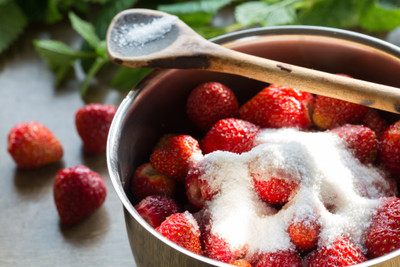Jam making: making the most of seasonal fruit
Posted by The Wares Team on 3rd Oct 2020
Everyone remembers the childhood delight of devouring hot buttered toast with a thick spread of fruity jam. Once the preserve, excuse the pun, of the formidable WI, more and more people are now making their own jam. The national lockdown, in response to the Coronavirus pandemic, led to people spending more time than ever before in their homes and learning new skills.
As has been reported, lockdown saw everyone putting on a pinny and
trying their hand at baking, while online garden centres quickly sold
out of fruit and vegetable seeds. For many, those seeds grew and have
been producing wondrous amounts of fruit and vegetables. There is
nothing more satisfying than seeing your plants grow and thrive and
picking your own produce. And, as Autumn sets in, there is also the joy
of taking long walks and foraging in the hedgerows for juicy
blackberries, rosy hips and haws and crab apples.
And that is where making jam comes in! It has always been the
misunderstanding that second-rate fruit should be used for making jam
but it is now recognised that the better and fresher the fruit, the
better the quality of the jam. Indeed, under-ripe fruit contains more
pectose, the key jam ingredient that turns to pectin as the fruit
ripens. So what better way to use up what can’t be eaten and stock the
shelves for winter? In today’s blog post we’re going to discuss the
convenience of the jam-making machine and how it can save you hours of
time while producing tasty jam on a consistent basis.
The brilliance of a jam making machine
Making jam by hand can be very time consuming, requiring close watch of
bubbling pans on hot cookers and after all that effort the results can
be inconsistent.
A jam making machine takes the hard work out of the process.
Simply add the prepared ingredients, wait for the signal to add the
sugar and leave the machine to do its job. Rather than taking hours of
stirring, the machine does it for you, while automatically controlling
the temperature of the ingredients, guaranteeing consistently delicious
batches of jam.
We stock the Ball freshTech machine on our website, which makes small
batches of up to four 240ml jars. This particular machine can also be
used for jelly, marmalade and chutneys, making the best use of your
tomato and vegetable crops. Even better - it is also non-stick,
essential when making something as sticky as jam - and dishwasher safe.
You can go from just fruit and sugar to jam in as little as 21 minutes.
How to store your jam…
The most practical, attractive and environmentally friendly way to keep
your jam and preserves is in the traditional glass jam jar. The jars
should be washed in warm soapy water, rinsed, dried with a clean tea
towel and then placed in a cool oven (around 140c) for ten minutes. The
jars can then be filled with the warm jam. Ensure the ladle is also
sterilised.
Once the jars are filled they should be stored in a cool, dry place, not
in direct sunlight. Jam should be enjoyed within 12 months of being
made - if it lasts that long! Once open, keep it in the fridge and use
it within the month.
As well as the traditional glass jam jar, we also stock jars in a
variety of shapes and sizes, from breakfast sized jars to the
traditional size and larger.
Who needs a jam making machine?
As already discussed, the trend towards home produce, whether you have
an allotment, garden or are making the most of pots on a balcony, seems
set to continue. For many, this was without doubt inspired by being at
home but it also taps into being more environmentally thoughtful; from
growing your own produce without pesticides and reducing food miles, to
reducing food wastage altogether.
Being able to create your own, personal range of jams, jellies and
chutneys is a win. Not to mention, lovely jars of homemade produce make
thoughtful gifts for Christmas and birthdays. We also stock a range of
attractive labels and tags to complete the look.
Jars of preserves sell out at fetes and farmers markets, raising lots of
money for good causes and producers alike. Classic favourites, such as
strawberry, plum, tomato chutney and orange marmalade always go down a
storm but why not try some more unusual flavour combinations, such as
spicy rhubarb and ginger or lime, gin and elderflower marmalade?
Have you recently got into making preserves but no longer have the time
to enjoy making it by hand yet still have all the produce? A jam making
machine might well be the answer! Share your unusual recipes on Twitter,
Facebook or Instagram.


